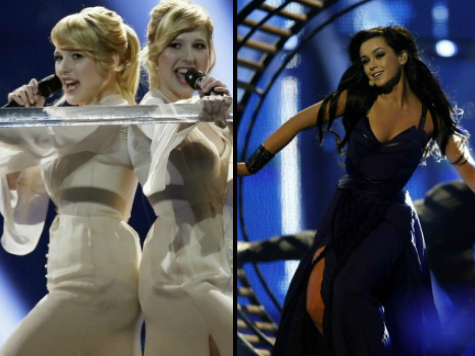
This Saturday, unbeknownst to most Americans, 26 performers enter the most politicized apolitical event in the world to defend their nations. While the Eurovision Song Contest may seem frivolous at a distance, it serves as a dumping ground for political baggage, and for no countries moreso this year than Ukraine and Russia.
Mariya Yaremchuk of Ukraine and Russia’s Tolmachevy sisters are keenly aware that their countries are at de facto war. They made as much clear by posing for a photo together, which made the rounds on Instagram with slogans like “Eurovision is not political.” Yet nothing could be further from the truth, as the audience made blatantly clear during the contest’s semi-final round last Tuesday.
Yaremchuk took the stage to thunderous cheers, while the young blonde girls found themselves tasked with drowning out boos. Their receptions had nothing to do with music.
This genre of dispute is a common one in a competition founded as a way to channel regional rivalries in any other possible way besides war.
In the shadow of WWII, the continent felt it had had enough. Enter Marcel Bezençon, who brought to the attention of the European Broadcasting Union that organizing an international song contest, based on Italy’s San Remo festival, could be a tool to unite nations and allow them to showcase their best art.
Eurovision did not remain apolitical for long, though contestants are not permitted to enter songs with political messaging. Its very existence prompted the creation of political rivals, like the Soviet Union’s “Intervision Song Contest,” which the BBC recalls was exactly as bad as it sounds. However, it was not until the fall of the Soviet Union and modernization of the tournament that voting, especially, became clearly political.
The Wire’s Lucy Westcott details the various Eurovision voting blocs; many are predictable. Scandinavian countries vote for each other; Spain and Portugal typically trade votes and, as a small coalition, always lose. For many years, the post-Soviet states formed a formidable coalition in favor of Russia, one which appears to slowly be disintegrating as Russia increasingly shuns the tournament.
The only exceptions to the voting rules are when political or economic events rally voters around a certain nation for reasons that have nothing to do with this brand of tribalism. In 2005, for example, the otherwise spectacular Elena Paparizou represented Greece with the lackluster song “My Number One.” In a year with this in it, Paparizou took the trophy, sending the 2005 competitors and deep-pocketed tourists to Athens. The year was not a great one for the European Union, but no country felt the pain more than Greece, which became the first country to fall under economic monitoring by the EU. Europe empathized and ignored the song’s complete lack of originality.
Notably, European countries whose economies were doing well that year fared poorly at the song contest. Germany came in 24th place out of 24; the UK, arguably the least successful Eurovision competitor in history, in 22nd.
When the economy began turning slightly around – in large part thanks to Angela Merkel’s generous hand – Europe was grateful. Europe gave the crown to yet another mediocre starlet, Lena, who took it back to Berlin in 2010.
Which brings us back to Maria Yaremchuk – an attractive young woman with a moderately listenable song from an extremely sympathetic country.
History indicates few will be harder to beat this year than she, and not just because Russia has turned regional public sentiment against it. Russia has also made the unwise decision of taking on Eurovision directly. Vitaly Milonov, the Russian legislator behind the nation’s controversial “gay propaganda” law, railed against Eurovision last week and called for Russia to boycott the “Europe-wide gay parade.” He also called it “the Sodom show,” in case his point was not clear, and called Austria’s cross-dressing entry a “pervert.”
Many will interpret this as a typically Soviet-sounding rant against fun from the Putin brigade; others will cry sour grapes, noting that the Eurovision trophy has eluded Russia, which has won only one title, despite valiant efforts involving powerhouse faux-gay (!) act t.A.T.u and these old ladies baking things. Either way, few Eurovision voters will appreciate the gesture, and whether Russia likes it or not, this will send a political message to the world that Europe rejects Putinist imperialism.
The counterintuitive reality that culture is always a superior vehicle for communicating ideology to mere politics will prevail, and it won’t be the first such statement. As Mary Chastain notes, many objected to Ukraine’s 2007 entry, “Dancing Lasha Tumbai,” performed by drag queen Verka Serduchka, because it sounded too much like “Dancing Russia Goodbye.” In a significantly more overt statement, Georgia’s 2009 entry was simply titled “We Don’t Wanna Put In” (get it?). Eurovision officials disqualified it for being too political.
That is not to say that Ukraine’s win is guaranteed. Unfortunately for Yaremchuk, the 2014 crop is a formidable one. Conchita Wurst, Austria’s bearded drag queen, received by far the most applause of any performer during her semi-final for “Rise Like a Phoenix,” a power ballad that could easily accompany a James Bond film. Greece’s “Rise Up” is techno-pop perfection from a nation historically successful with high-energy performances. France’s entry is called “Moustache,” and that’s really all you need to know.
This year – just like every year – Europeans will take out their intercontinental grievances on the glitteriest stage in the world, and competitors will have to contend with more than their talents. It behooves political observers to keep an eye (or ear) out, just as Marcel Bezençon intended.

COMMENTS
Please let us know if you're having issues with commenting.